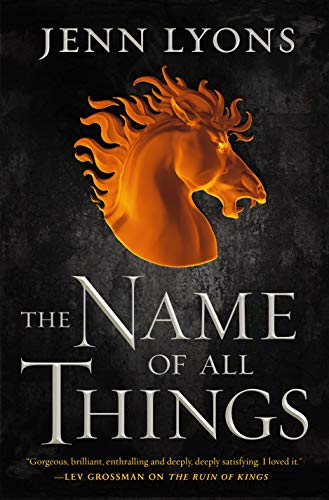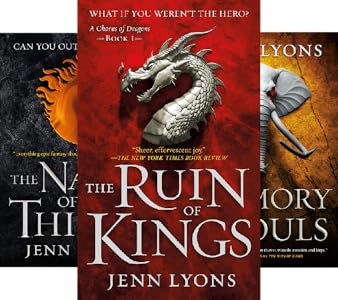
![]() The Name of All Things by Jenn Lyons
The Name of All Things by Jenn Lyons
The Name of All Things (2019) follows up Jenn Lyons’ debut novel The Ruin of Kings, though “follows” is a bit of a misnomer since the vast majority of the book actually takes place concurrent with its predecessor’s action. I had some issues with book one, mostly with the structure, and while some of that carries over, albeit in different fashion, I found The Name of All Things to be an improvement overall.
The story opens shortly after the ending of The Ruin of Kings, with that novel’s main character Kihrin meeting Count Janel Teranon and her companion Brother Qown, who seek his help to kill a dragon. As Janel and Qown wait for a third compatriot, they take turns telling their story to Kihrin, explaining how they’ve gotten to this point and why they need to kill a dragon. Their background runs parallel to much of the plot of book one, with Janel telling her story in first person and Qown telling his in third as they travel through a new part of this universe — Jorat, home to the intelligent horse creatures called Firebloods — and unravel a villainous conspiracy that threatens the stability of Janel’s homeland and the world itself.
My major issue with the first book was its overly and unnecessarily convoluted structure. Here again, I confess, I didn’t think the back and forth structure added much to the story and felt at times contrived and repetitive. And while like with The Ruin of Kings, a snide narrator adds some welcome humor, it does at times feel forced or prove distracting. That said, the structure is far less of a hindrance thanks to its more linear progression, though The Name of All Things does have some pacing issues outside the narrative structure, bogging down in several segments.
 Mostly, though, Lyons tells a solid story with some strong set pieces, such as an attack on a city by a massive and wonderfully creative dragon (I won’t spoil the description here) or what equates to a bioterrorism attack on a smaller town. One of the strengths of The Ruin of Kings was its world-building and that remains true here as the world expands. Jorat, as noted, is a culture centered around the Firebloods, but Lyons takes it a step beyond what we usually see of horse cultures in fantasy, with the thinking more wholly woven into their language, society, viewpoints toward gender, and more. We don’t get the same level of detail really outside of Jorat, but what we do get creates a sense of richness to this universe, as well as hinting at potential for further exploration in later A CHORUS OF DRAGONS books.
Mostly, though, Lyons tells a solid story with some strong set pieces, such as an attack on a city by a massive and wonderfully creative dragon (I won’t spoil the description here) or what equates to a bioterrorism attack on a smaller town. One of the strengths of The Ruin of Kings was its world-building and that remains true here as the world expands. Jorat, as noted, is a culture centered around the Firebloods, but Lyons takes it a step beyond what we usually see of horse cultures in fantasy, with the thinking more wholly woven into their language, society, viewpoints toward gender, and more. We don’t get the same level of detail really outside of Jorat, but what we do get creates a sense of richness to this universe, as well as hinting at potential for further exploration in later A CHORUS OF DRAGONS books.
There’s also a nice sense of complexity and depth to the story, as Lyons deals with issues with clear analogues in our own world, such as colonialism/imperialism or gender and sexuality. At times, I’d argue the writing is a bit too on the nose in the way the issues rise to the surface, but mostly to the extent of being noticeable rather than problematic. Characterization, particularly of Janel, is also nicely complex as are questions regarding who is doing “good” and who is doing “evil,” if again, at times too bluntly raised.
I can’t say the story was compelling; I wouldn’t call The Name of All Things a page-turner. And I felt pretty confident it could have lost 100-150 or so pages. But despite the afore-mentioned bog-downs and feeling its length, it held my attention throughout and had me finishing it over two days. And the improvement from book one, I’d say, bodes well for the third book, which I’m assuming will move the story along more fully in terms of time. So far so good, then.



It sounds like the author has thought carefully and deeply about the fictional world. That’s always a pleasure to read.